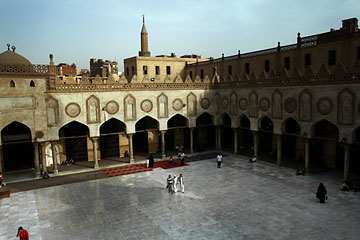
Cairo's al-Azhar Mosque, founded in the 10th century, remains the focal point of the university
(3 of 4)
Prestige Restored
When revolution came to Tahrir Square, Ahmed el-Tayeb had been sheik of al-Azhar for less than a year. Educated in Islamic philosophy at the Sorbonne, el-Tayeb represented almost an extreme of moderation: he wore a suit instead of robes until he took the top job. And as a Sufi, he counts himself a follower of Islam's most mystical stream, one with deep roots in Egypt. But like his recent predecessors, he also carried the taint of the Mubarak regime, having served on the policies committee of the ruling National Democratic Party headed by Mubarak's son Gamal.
In the fluid aftermath of the revolution, however, el-Tayeb made a series of savvy moves designed to restore the reputation of the sprawling institution, each playing up al-Azhar's centrality to Egyptian public life while professing an aversion to the grubbiness of politics. Al-Azhar issued a number of declarations on the Future of Egypt, urging an inclusive, secular state respectful of religious minorities. It reached out to the 10% of Egyptians who are Coptic Christians, winning the trust of their Pope by establishing an ecumenical "Egyptian family house" and dispatching teams into the hinterland to promote tolerance amid increasing attacks on Christians. (When a Cairo cathedral was attacked by Muslim extremists in April, during a funeral for Copts killed in earlier attacks, Pope Tawadros II said el-Tayeb was the first outsider to call expressing concern.) And when self-righteous politicians refused to meet one another, al-Azhar issued invitations, and the recalcitrant leaders dutifully showed up. All this high-minded activism both buffed al-Azhar's stature and caused el-Tayeb's controversial history with the Mubarak regime to fade. "This was the first state institution that tried to reform itself," says Fahmi.
But its reinvigorated prestige is also what makes al-Azhar a target for takeover. Egypt's military first filled the power vacuum left by Mubarak's resignation, but as elections approached, it became apparent that the new Egyptian democracy would be dominated by religious parties. Al-Azhar's leadership had no appetite to be controlled by the Muslim Brotherhood or by the Salafists, who gained popularity quickly after the ouster of Mubarak. In January 2012, just four days before a new parliament took office, the Supreme Council of the Armed Forces decreed that the President would no longer appoint the grand sheik of al-Azhar. Henceforth, the sheik would be selected by a council of 40 senior religious scholars — a panel that el-Tayeb would appoint himself, after which it would become self-perpetuating.
The arrangement essentially left the future of Islam's most esteemed institution in the hands of the comparatively liberal el-Tayeb, who selected the crucial council "all from among his friends and allies," says Amr Ezzat, a researcher at the Egyptian Initiative for Personal Rights, a civil-liberties group. El-Tayeb appears intent on building a firewall between the upper reaches of al-Azhar and everyone else, including fundamentalists who want to make Shari'a the law of the land. "We are not a governing institution," says his aide, Nosair.
That's not exactly what Egypt's new constitution says, however. Article 4 of the new charter states that al-Azhar's scholars would be consulted on matters related to Islamic law, though whether the opinion is binding is left ambiguous. The measure was put forward early in the constitutional negotiations by nonreligious activists anxious to check the hegemony of the ascendant Brotherhood; in al-Azhar they believed they had a moderate counterweight with unimpeachable Islamic credentials. There are only two problems with the maneuver, critics point out. One is that Article 4 assures that Islam — which another article blandly declares will inform all of Egypt's laws — will have a prominent place in Egyptian politics. The other danger is the assumption that al-Azhar will remain committed to wasatiyya, or moderation. What will the Egyptian state look like if future al-Azhar leadership insists that laws be written consistent with a rigid puritanical vision of Islam? "It works with Ahmed Tayeb," Fahmi says of the arrangement. "With anybody else it might be a nightmare."
